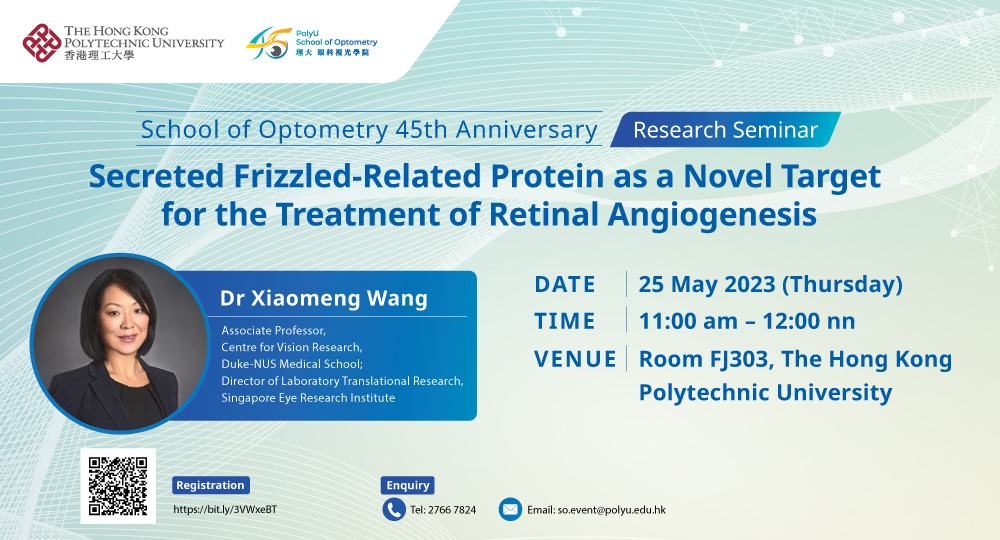PolyU School of Optometry 45th Anniversary Research Seminar on Secreted Frizzled-Related Protein as a Novel Target for the Treatment of Retinal Angiogenesis
Conference / Seminar

-
Date
25 May 2023
-
Organiser
School of Optometry
-
Time
11:00 - 12:00
-
Venue
Room FJ303, PolyU
Speaker
Dr Xiaomeng Wang
Summary
Abnormal blood vessel formation is the leading cause of blindness. The standard of care for ocular angiogenic diseases is dominated by inhibitors targeting vascular endothelial growth factor (VEGF). However, a substantial number of patients do not respond to the treatment or may develop resistance over time, which is, at least, partially due to the compensatory activation of alternative angiogenic pathways in response to anti-VEGF treatment. Using an untargeted Proteomics-based approach, our study reveals a significantly lower level of a secreted frizzled-related protein (SFRP) in the vitreous of PDR patients as compared to that in control patients. We then constructed a fusion protein containing the SFRP and Fc portion of IgG and demonstrated a potent inhibitory effect of SFRP-Fc on retinal microvascular endothelial cell (HREC) proliferation, viability, and tube formation as well as vessel outgrowth from the choroid, aortic ring, and metatarsal explants. SFRP-Fc is also able to prevent and reverse laser-induced choroidal neovascularization (CNV) in mice. We further demonstrated that the C-terminal domain of the SFRP (SFRPC) is responsible for its anti-angiogenic effect. Importantly, SFRPC-Fc synergistically inhibits CNV in combination with the anti-VEGF drug, Aflibercept. Mechanistically, SFRP inhibits angiogenesis by interacting with Caveolin, suppressing its phosphorylation, and altering the endocytosis of cell surface receptors. In summary, this study leads to the discovery of a novel inhibitor of angiogenesis, identified its functional domain, and established its mechanism of action.
Keynote Speaker

Dr Xiaomeng Wang
Associate Professor, Centre for Vision Research, Duke-NUS Medical School
Director of Laboratory Translational Research, Singapore Eye Research Institute
Dr. Xiaomeng Wang is an Associate Professor at the Centre for Vison Research, Duke-NUS Medical School; Director of Laboratory Translational Research and Head of Ocular Therapeutics and Drug delivery at Singapore Eye Research Institute. Prior to this appointment, Dr. Wang worked as an Associate Professor at the Lee Kong Chian School of Medicine, Nanyang Technological University Singapore. Dr. Wang obtained her BSc. in Biology at Beijing Normal University, China and her PhD in Genetics at Newcastle University, UK. Thereafter, she undertook post-doctoral training at Manchester University and University College London, UK. Dr. Wang’s laboratory aims to understand molecular and cellular mechanisms underlying fibrovascular complications, especially those in the eye. Our ultimate goals are 1) to identify reliable biomarkers for disease prediction, diagnosis and prognosis; 2) to develop novel therapeutic approaches for more effective disease management; 3) to establish disease relevant in vitro, ex vivo and in vivo models.





